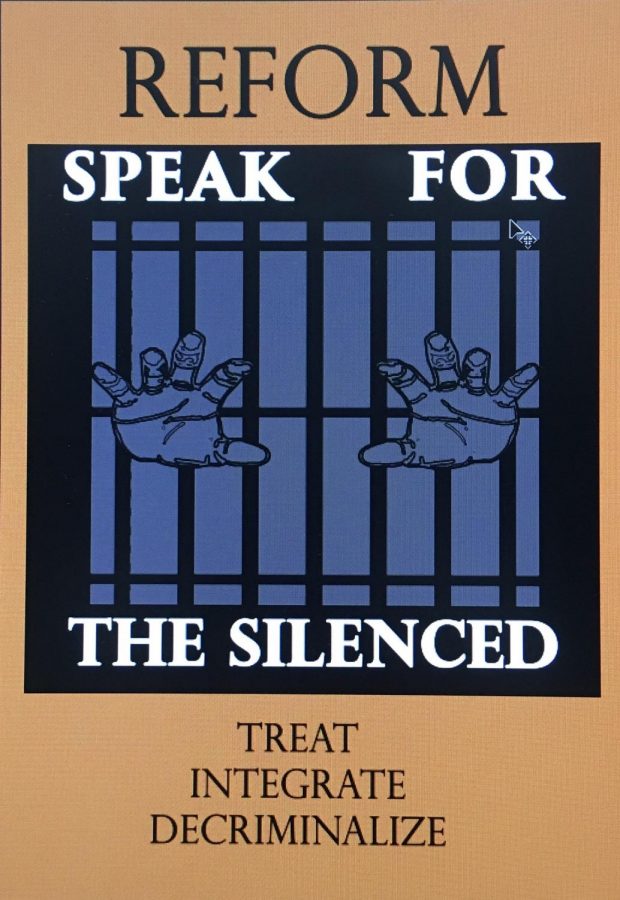Did the Justice System Fail Cyntoia Brown?
A social justice project by Gabe Rozzell created for La Salle’s art program, representing falsely incarcerated people.
January 23, 2019
In 2004, a 16-year-old girl named Cyntoia Brown was convicted of murdering a man, and sentenced to life in prison. At the time, this case caused tons of uproar and sparked many debates on how this incident should have been handled. This year, she has been granted clemency and will be released in August 2019. She will have to spend 10 years on parole.
This story began on August 7, 2004, when Nashville police found the body of Johnny Allen, a 43-year-old man, nude and face-down in his bed. He had been shot in the back of the head. On the morning of August 8, the police found Allen’s white pick up truck in a parking lot. Later, they arrested a then teenage girl, Cyntoia Brown. She had been staying in a motel with her pimp, Garion McGlothen, who also went by the name “Cut Throat.”
Brown claimed that McGlothen was regularly physically and emotionally abusive, and that he forced her into prostitution.
Brown confessed to killing Johnny Allen, but said that it was self defense. She said that she saw him roll over and believed he was reaching for one of his guns. Brown claimed Allen had solicited her for sex and promised to give her $150. Since she was 16 years old, it would be statutory rape if they had sex. However, according to Brown, they did not have sex before she shot Allen. Brown said the reason she took Allen’s wallet and some of his guns was because she didn’t want to go back to McGlothen empty handed.
Brown was then convicted of first degree murder, felony murder, and aggravated robbery and sentenced to life in prison. Then her legal team pointed to the 2012 U.S. Supreme Court case where they ruled that to have a child serve life imprisonment was a cruel and unusual punishment. In 2018, the Tennessee Supreme Court voted that she would be up for parole on her 69th birthday.
This case is more complex than the simplified version makes it sound. While researching this case, I didn’t realize that, for the most part, Brown claimed that she was trafficked and Allen solicited her for sex, but that was not what the prosecution argued. From Cyntoia Brown’s side, her story is a sad and tragic one. But the police have a different view of what happened.
The police say that Allen probably picked her up off the street because he thought Brown was homeless. He then welcomed her into his home, and she then shot him in his sleep and stole his wallet, some of his guns, and his truck, and he did not have relations with her.
The reason they take this stance is because they believe there are some things off with her story. Personally, I can understand the points. The police didn’t understand why she would carry a gun in her purse. Another thing Brown said that they found inconsistent was the fact that she had said that she had believed he had been reaching for a gun. When the police found Allen’s body, his hands were underneath him.
They also had some character witnesses for him. While I understand the importance of a character witness, I personally tend throw out this bit of information from cases because I believe that anyone is capable of anything.
It is important to note that the prosecutor of this case tried to paint Allen as the good Samaritan. So, in their story of what happened they would obviously support this. I have my own issues with what they believe.
One being, let’s say he was being a good person and decided to help out a teenage girl. Why was he naked in his bed? To me, this makes no sense. If you have a complete stranger in your house that you are trying to help out, why would you go to bed nude. It doesn’t add up.
The second thing is the fact that she said she believed he was reaching for a weapon. Not that he was. Another fact to keep in mind is that Brown has Fetal Alcohol Syndrome. This condition causes a person to have trouble with attention, processing information, as well as difficulty with reasoning, problem-solving, difficulty identifying consequences of choices and poor judgment skills. This mental health issue is most likely the reason for her belief that her life was in danger.
Third, it is totally plausible for her to be carrying a gun. Think about it: once a pimp has brainwashed their victim enough, they won’t run away. And if that victim happens to be their meal ticket, why not give them a weapon? They know that their victim won’t use it against them, and if someone is trying to attack their source of income, they’re not going to want their worker to die.
The saddest factor is the final nail in the coffin for this case. Back in 2004, children could be charged with prostitution. This essentially means that, if a child was kidnapped and then forced into child sex trafficking, they could be charged with prostitution if they tried to report the people who forced them into that. This caused an issue when it came to pleading self defense for Cyntoia Brown.
In Tennessee, the law of self defense says that you cannot use self defense if you were engaging in illegal activity at the time. And legally, at the time, she was. However, as of 2011, this law has been changed in Tennessee, so now someone under 18 cannot be tried with prostitution. But at the time, since Allen was going to pay her money for sex, Brown was engaging in illegal activity, which makes claiming self defense insufficient, because at the time she was breaking the law.
Although at the time the “transaction” had not taken place, her reason for being there was still considered illegal. To clarify, I do not agree with a child being able to be prosecuted for prostitution. I am simply explaining one of the possible reasons that Brown was found guilty at the time.
Personally, I believe that if this case was tried in court today, she would have been found not guilty. She was not only a victim of sex trafficking but a victim of an unfair law. On top of this, Brown’s mental disability of Fetal Alcohol Syndrome should have saved her from going to prison. This syndrome makes her unable to understand her actions, consequences, and gives her poor judgment.
I am glad that Republican Gov. Bill Haslam granted her clemency, even though this means she is still considered guilty of this crime, which I disagree with. I believe this is a step in the right direction, serving justice in a case that is a prime example of what an unfair law can do. I hope that, even though Cyntoia Brown has spent the last 15 years in prison, she will be able to succeed in her upcoming life as a free woman, as her parole is set for August of 2019.





